#J.A. Seazer
Explore tagged Tumblr posts
Text
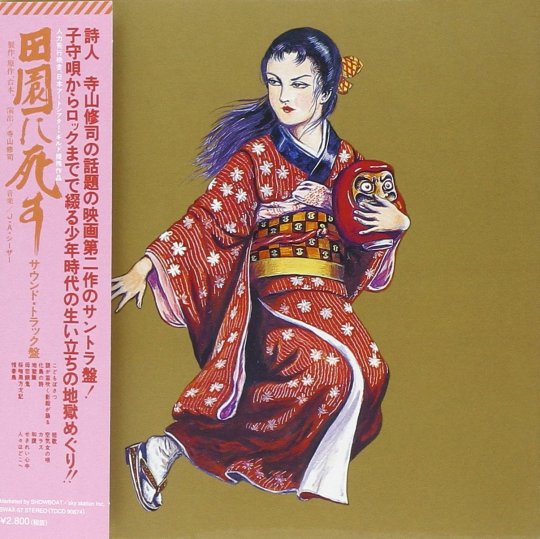
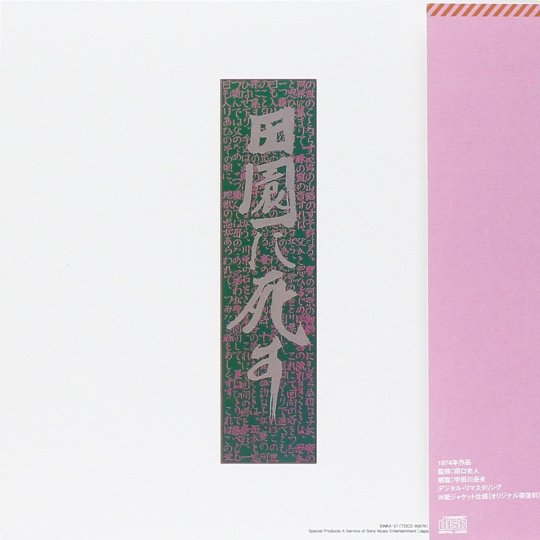
田園に死す (Den'en ni shisu) (1974)
35 notes
·
View notes
Text
"I owe it all to Producer Ohtsuki's competence for having the chance to work with Mr. Seazer. But that is not the only thing Mr. Ohtsuki has done; he shouldered the huge risk to deliver 'Revolutionary Girl Utena' to this world. We, the staff, got the total creative freedom despite his risk. Although I've met many fake adults who said, 'believe in your youth and possibilities,' it was my first time to meet with an adult who actually took a risk. Of course I carried some risk, but the risk that he was shouldering was too big compared to mine. However, not even once did he demand of me to take any more of a risk. He taught me the importance of taking a risk for a production. That became a valuable motivation for me in terms of the production for this project."
- Kunihiko Ikuhara, regarding working with J.A. Seazer and Ohtsuki Toshimichi, in the Liner Notes of the US Release for Angelic Creation, Namely, Light, via Ohtori.nu
#revolutionary girl utena#shoujo kakumei utena#angelic creation namely light#j.a. seazer#ohtsuki toshimichi#Kunihiko Ikuhara
49 notes
·
View notes
Text
"Earth Prison Panopticon" - Revolutionary Girl Utena - Image Song
Requested by Anon
109 notes
·
View notes
Text
Revive! O Immortal History, the Middle Ages! Bearded and long-haired, looking like primitive barbarians from a forgotten era, the alchemists thought "If the imagined spirit (archaeus) dwells within the womb, then with a made space like the womb, it is possible to sow semen therewithin by scientific method and create artificial life," and peered at the black figure within the retort. The cursed science. The dim laboratory. The small, solitary life. The theme of endless temptation — that splendor — and the medieval wizards dreaming their transparent fantasies. The Book of Nature, The Book of Monsters, The Book of All Creation, The Book of Discovery and Invention, The Book of Angels, The Book of Hermaphroditism, The Book of Magic, The Book of the End of the World, The Book of Eroticism, The Book of Paganism, and The Book of Secrets. I composed by the light of a burning candle for four days and three nights. When I threw open the window and looked towards the burning red of the evening sun, I saw a million medieval alchemists wearing armor, straddling white horses. I called out to them! "Utinam reviviscat Medium Aevum! Let the medieval age return to life! In our souls! Our spirits! Our flesh! Our eyes! Our hands! Our blood and breath! Come to life! Medieval age! The whole of that time! In our rooms! Our clothes!"
---j.a. seazer, liner notes for the 7th revolutionary girl utena soundtrack "revival record of the rose egg SOFIA"
35 notes
·
View notes
Text
Shit!!!!! I have polls!!!!!! Omg!!! Wretched day is less wretched. So like. I feel like I have too much power but.
92 notes
·
View notes
Text
Fuck it. I'm posting it now
44 notes
·
View notes
Video
youtube
3 notes
·
View notes
Photo
I just want to add that the song playing during this scene is titled ‘Allegory, Allegorier, Allegoriest’.

If I had to pick one screenshot to summarize Revolutionary Girl Utena, it might just be Utena and Anthy huddling together while Utena cuts a stream of oncoming cars in half with her sword, with “As we are eternally absent, it becomes just an allegory” superimposed on the screen.
#revolutionary girl utena#shoujo kakumei utena#j.a. seazer#queue look so fine#trippy sword lesbians#other notable song titles in this series include#i am an imaginary living body#internal clock municipal orrery#the natural compatriot’s palace perspective book#conic absolute egg algebra#and of course#last evolution (eve of the evolution revolution)
1K notes
·
View notes
Text
18 notes
·
View notes
Text
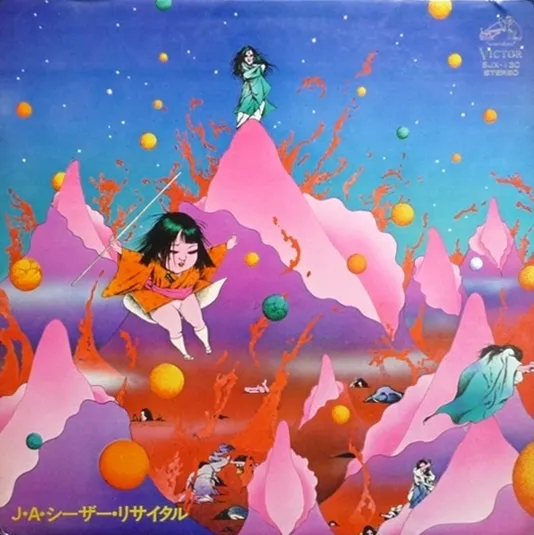
#Psychedelic Rock#Progressive Rock#Experimental Rock#Avant-Folk#Film Soundtrack#Rock Opera#1970s#2010s#Japan#poll
73 notes
·
View notes
Text

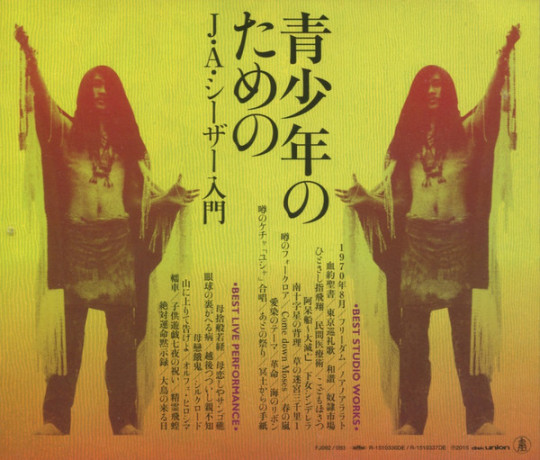
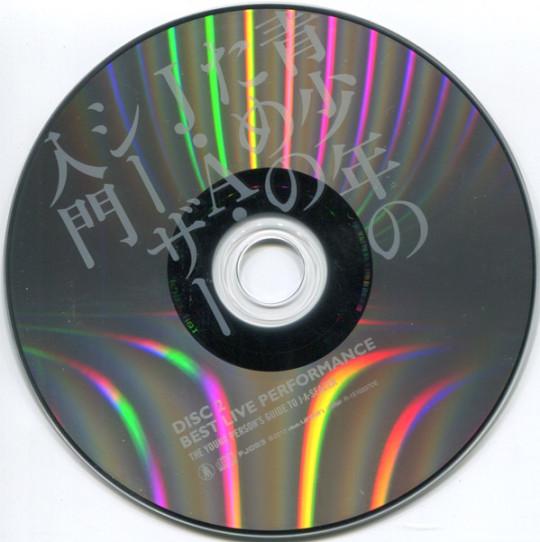

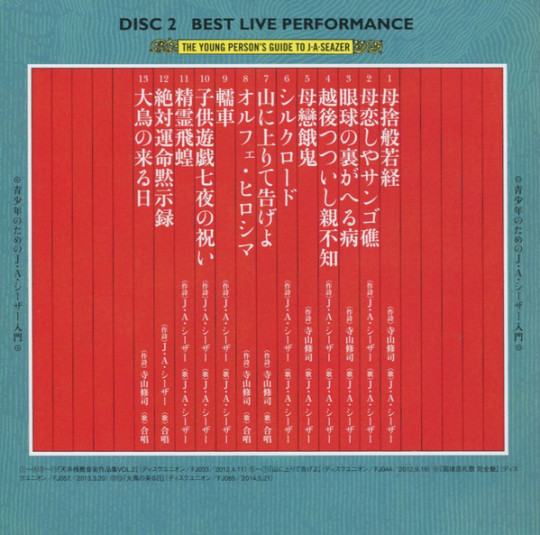
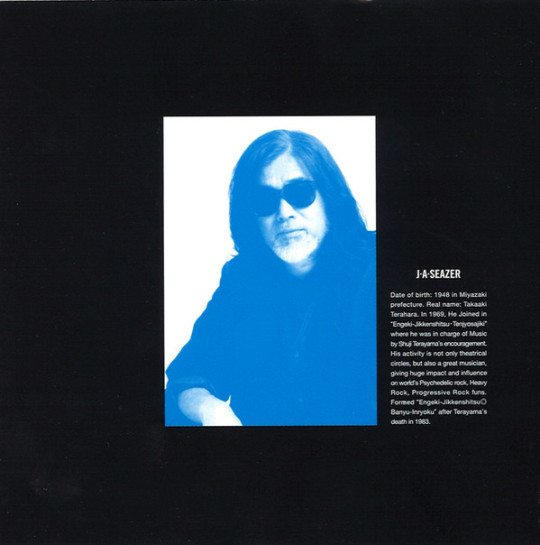
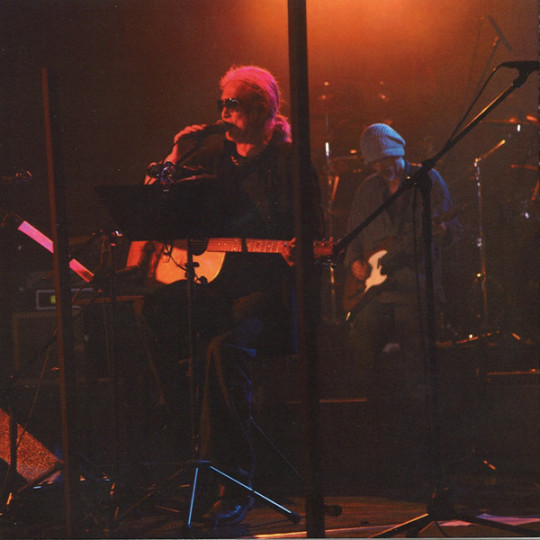

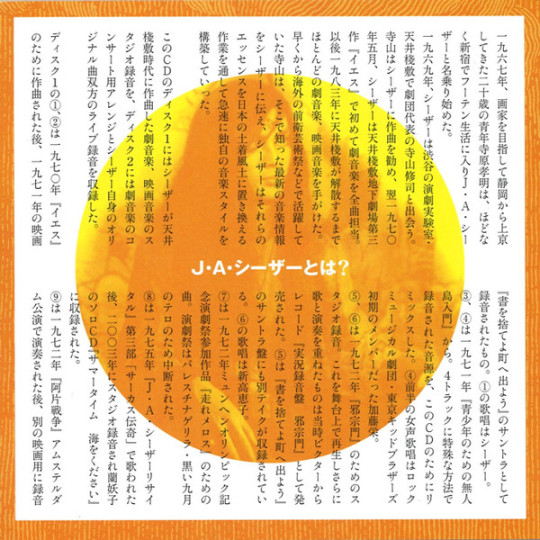
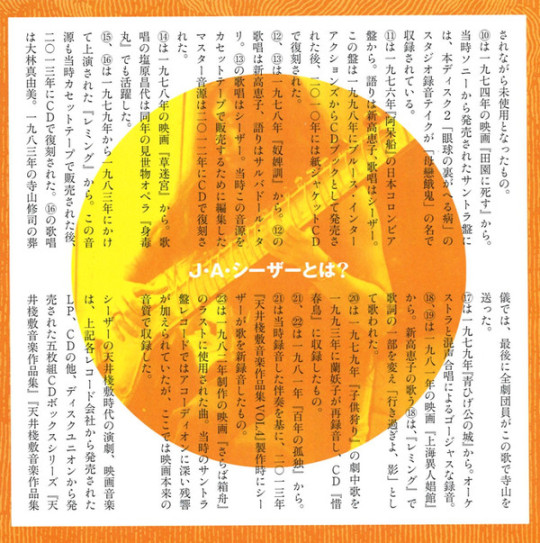
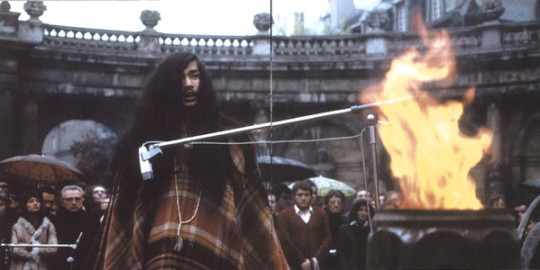

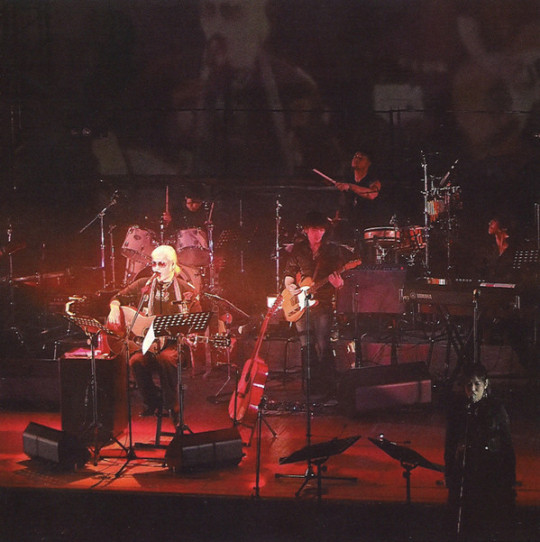
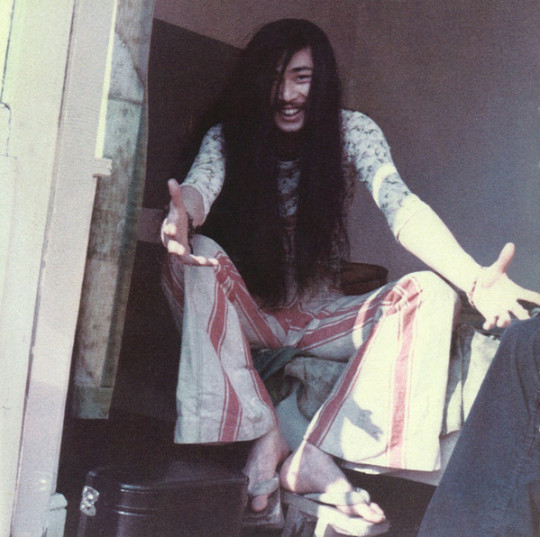
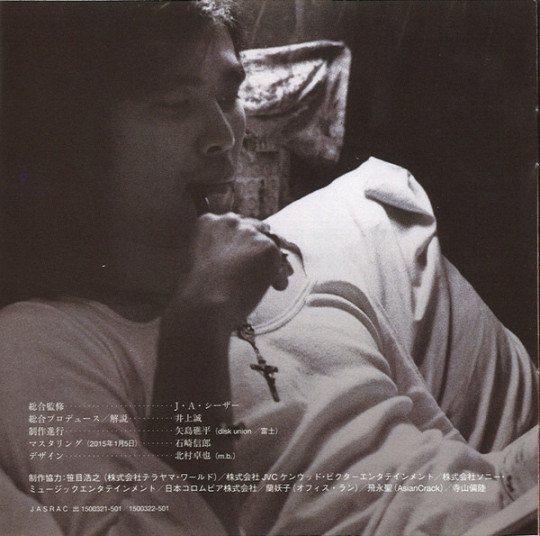
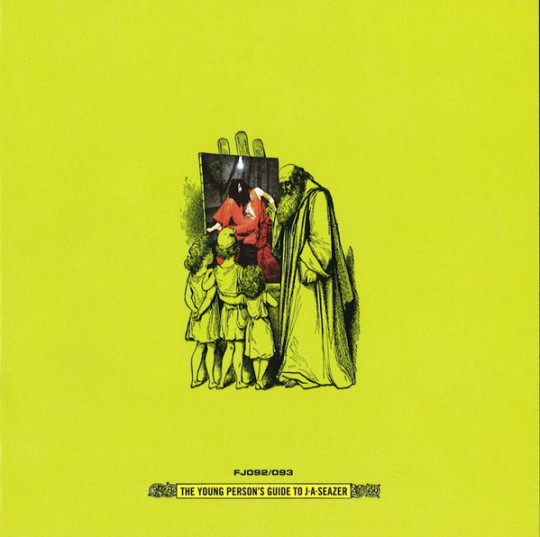
J. A. Seazer 青少年のためのJ・A・シーザー入門 = The Young Person's Guide To J. A. Seazer
37 notes
·
View notes
Text
Round 6 - FINALE
The winner takes all! Which piece of media deserves to be the Champion of 1997?

Revolutionary Girl Utena: If it cannot break its shell, the chick will die without ever being born. This sentiment, originally found in Hermann Hesse’s 1919 novel Demian, features during a repeated sequence in the 1997 anime Revolutionary Girl Utena. Hesse is far from the only reference to philosophical, surrealist, or heavily symbolic text in the show, which trades in visual metaphor and multi-layered subtext. Revolutionary Girl Utena follows the story of Utena Tenjou, a young orphan who aspires to princehood-- challenging or outright circumventing the place of gender in that aspiration-- and is entangled in a series of duels centered around a girl named Anthy Himemiya. Written by Kunihiko Ikuhara, Chiho Saito, and Yōji Enokido (known collectively as Be-Papas) and soundtracked by J.A. Seazer and Shinkichi Mitsumune, the show has an instantly recognizable style, combining lush fairytale visuals and French-inspired architecture with a choir that functions as a sort of Greek chorus to the internal worlds externalized in combat. Utena is a story about many things, arguably all things, taking a surgical scalpel to adolescence and using the flat of the blade as a paintbrush, leaving a deeply human, visceral work of art in its wake. It has been massively influential on feminist, queer & sapphic, and otherwise gender-deconstructive or gender-subversive modern media. Smash the world's shell! For the revolution of the world!
Radiohead's OK Computer: I go forwards, you go backwards, and somewhere we will meet. By the middle of the decade, Radiohead was weary of the ubiquity of their 1993 hit Creep; although the record that followed it (The Bends) was a lusher, more evolved album than their first, it had failed to produce a distinctive enough image for the band to undo what Creep had done. The song threatened to define the band entirely to those outside their devoted following. In 1997 the band swung for the fences with the haunting, abstract OK Computer. It was a move their label cast immense doubt on at the time, and its success then and now would cement Thom Yorke and his bandmates as soothsayers of a sort, draped not in bohemian silk robes but in white hospital sheets. It's an album that speaks to the future with dread more than wonder, that critics described as "nervous almost to the point of neurosis," but marries the uneasy experimental soundscapes with poetic, surrealist, and increasingly prophetic songwriting regarding the parallel lives we lead with technology. Featuring the singles Karma Police, Paranoid Android and No Surprises, OK Computer is hailed by many as the band's magnum opus: it's certified double Platinum in the US and five-times Platinum in the UK, and in 2014 it was included in the United States National Recording Registry as "culturally, historically, or aesthetically significant."
#revolutionary girl utena#shoujo kakumei utena#kunihiko ikuhara#radiohead#ok computer#thom yorke#1997
105 notes
·
View notes
Audio
“Bara no Rashin ~ Shura - Nikutai Seiza Alpha Psi Zeta Seiun” - Adolescence of Utena - Juri Arisugawa Duel Theme
Requested by @theunstablejester
#revolutionary girl utena#adolescence of utena#shoujo kakumei utena#j.a. seazer#tokyo mixed chorus#request sunday#sorry i didn't see your message until today! hope it's better late than never
150 notes
·
View notes
Text
does everyone else already know that j.a. seazer's song 天然同胞宮殿遠近法/the natural compatriots' palace perspective book is about the 1560 book livre de perspective by jean cousin the elder and you didn't tell me
#actually i think it might specifically be about this shibusawa tatsuhiko essay on the platonic forms#theres a section on kepler's use of them in his solar system model + the planetary orbits. that matches with the song's middle verse#j.a. seazer#shoujo kakumei utena#actually. is the 'palace' the solar system and the 'compatriots'/siblings the planets.......
5 notes
·
View notes
Note
top 5 reasons to watch utena?
in no particular order:
the music: surprise bitch utena is a musical! aside from the intro, the ED, and zettai unmei mokushiroku, pretty much every episode has an original song, usually but not always during the duels (some of the most iconic being ammonite, missing link, and dona dona). the OST is also absolutely amazing, composed by j.a. seazer and featuring absolute bangers such as hikari sasu niwa and shi no aphrodite.
the character dynamics: i have said before that the characters of utena come in endlessly duplicated sets of three from the original akio matrix, with each character still maintaining their uniqueness: juri is a girlprince like utena, but she's closeted rather than oblivious; touga is an akio, but his youth and trauma prevent him from achieving his same position, and so on.
the symbolism: utena fans are perhaps right behind evangelion fans when it comes to annoyingly overanalyzing symbolism, and i love that for us — the colours and the car and the prince and the stars are pretty basic symbols, but others like the stopwatch and the animals and the hair and the cooking have broader interpretations, and it's fun to theorise about them.
the themes: much has been said about utena's commentary on gender and race and abuse and love and family and capitalism, and all that is present, but the most basic barebones message of utena is a coming-of-age one, about breaking free of societal demands for teens and young adults to find who you really want to be and what values you want to embody for yourself, which i found really inspiring on my first watch.
the cultural relevance: especially if you already like anime and shojo, you have been exposed to utena already, whether in direct reference or in inspiration: it's a cult classic of the magical girl and deconstructionist shojo genres, containing lots of references to previous genre cornerstones, and with its main creatives ikuhara and enokido as well as the rest of be-papas going on to work in more prestigious anime.
150 notes
·
View notes
Note
So looking on your website it seems like Ikuhara is the male voice for Zettai Unmei Mokushiroku, is that correct or am i reading your credits wrong?
Nope, you're reading that right! Ikuhara does indeed provide vocals for not only ZUM, but other chorus tracks from the series! There are complete scans of the OSTs in my Utena tunes history website, Audiology of Utena. To give you a breakdown of coolness:
The Student Council Saga's duels credit Suginami Jidou Gasshoudan (a junior choir), Maki Kamiya (who solos the Virtual Star Embryology ED), Kunihiko Ikuhara, and Shinkichi Mitsumune (the BGM composer) as the chorus for these recordings.
The Black Rose Saga's OST 2 is where it gets real wild! Not only are Ikuhara and Mitsumune credited on all the duel chorus tracks, Shingo Kaneko and Toshimichi Otsuki are credited on some: Utopian Past Tense Incantation (Kozue's), Conic Absolute Egg Archibras (Tsuwabuki's), Transparent Period of Adolescence (Keiko's), and Magic Lantern Butterfly Moth 16th Century (Wakaba's.) Kaneko is a storyboard artist and episode director, and Otsuki is a producer. Lol. This absolute party of nerds is also credited for the performance of the two songs from the Sega Saturn video game on OST 3, Herzen's Head and The Inversion of Me and My Room, and they are also the credited group for the Black Rose Saga's version of ZUM.
OST 3 covers the Akio Arc, where the auditory soundscape of the duel choruses shifts away from compositions of J.A. Seazer's work by Shinkichi Mitsumune, and those tracks are instead composed and recorded by Seazer with his own 'Theater Laboratory - Universal Gravitation.' No one else is credited in the chorus for those songs.
tl;dr: Ikuhara, as well as Shinkichi Mitsumune, are in the first two versions of ZUM, as well as the duel choruses for the first and second arc. They are occasionally joined in the second arc by other definite Not Singers from the production team. The Akio Arc and on however are recorded by Seazer with his musical theater group, and don't appear to include Ikuhara and co.
#utena#revolutionary girl utena#ikuhara#utena music#utena meta#utena history#rgu#sku#shinkichi mitsumune#be-papas
161 notes
·
View notes